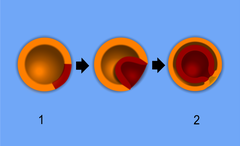
Back Embriologie Afrikaans علم الأجنة Arabic Embrioloxía AST Embriologiya Azerbaijani Эмбриология Bashkir Эмбрыялогія Byelorussian Эмбрыялёгія BE-X-OLD Ембриология Bulgarian ভ্রূণবিদ্যা Bengali/Bangla Embriologija BS


Embryology (from Greek ἔμβρυον, embryon, "the unborn, embryo"; and -λογία, -logia) is the branch of animal biology that studies the prenatal development of gametes (sex cells), fertilization, and development of embryos and fetuses. Additionally, embryology encompasses the study of congenital disorders that occur before birth, known as teratology.
Early embryology was proposed by Marcello Malpighi, and known as preformationism, the theory that organisms develop from pre-existing miniature versions of themselves. Aristotle proposed the theory that is now accepted, epigenesis. Epigenesis is the idea that organisms develop from seed or egg in a sequence of steps. Modern embryology developed from the work of Karl Ernst von Baer, though accurate observations had been made in Italy by anatomists such as Aldrovandi and Leonardo da Vinci in the Renaissance.[citation needed]
© MMXXIII Rich X Search. We shall prevail. All rights reserved. Rich X Search